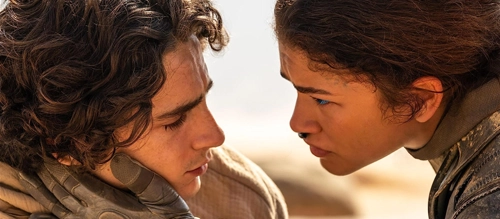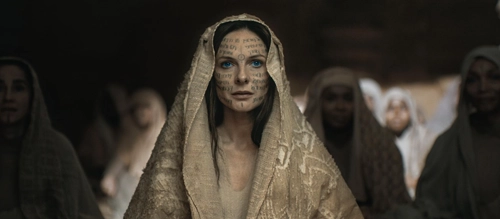Dune: Part Two (2024) Review

Dune: Part Two (2024)
Director: Denis Villeneuve
Screenwriters: Denis Villeneuve, Jon Spaihts
Starring: Timothée Chalamet, Zendaya, Rebecca Ferguson, Josh Brolin, Austin Butler, Florence Pugh, Dave Bautista, Christopher Walken, Léa Seydoux, Souheila Yacoub, Stellan Skarsgård, Charlotte Rampling, Javier Bardem
In Dune: Part Two, Paul Atreides (Timothée Chalamet) and his mother, Jessica (Rebecca Ferguson), are taken in by the Fremen, the indigenous people of the desert planet Arrakis, following the extermination of House Atreides in the previous film, which resulted in the death of Paul’s father, Duke Leto Atreides (Oscar Isaac). Forced into exile and struggling against the inevitability of the Bene Gesserit’s prophecy that would see him rise as a Messiah for the Fremen people, Paul swears revenge against the Harkonnens and the whole of the imperium.
“Your father didn’t believe in revenge,” Jessica tells him.
“I do,” Paul replies.
There are no heroes in Dune: Part Two, director Denis Villeneuve’s follow up to his 2021 Oscar-winning sci-fi epic Dune, which was a surprise pandemic-era box office hit, despite being released simultaneously by Warner Bros. in theaters and on its streaming channel, Max. Initially slated to premiere in November of 2023, but delayed due to the SAG-AFTRA strike, Dune: Part Two is an adaptation of the second half of Frank Herbert’s landmark science fiction novel of the same name, and picks up immediately where the last film left off. Over the course of its 167 minute runtime, Villeneuve builds upon the foundation laid in the previous film, expanding the story in scope and deepening the subversive, dark themes of Herbert’s literary work. Though the film is no doubt a stunning visual and auditory experience, Villeneuve’s focus on mood over substance, like cracks in a carefully laid foundation, weakens the film’s ability to land on its feet.
Dune: Two Part begins in the desert where we left Paul and Jessica at the end of Dune. With his house destroyed, Paul leads the Fremen people in a war against the House Harkonnen, led by the fascist Baron Vladimir Harkonnen (Stellan Skarsgård), who have resumed control over the spice trade and are struggling to turn a profit due to Paul’s acts of sabotage. Meanwhile, Paul begins a relationship with the girl he dreamed about in the first film, Chani (Zendaya), and struggles against the prophecy his mother, now Reverend Mother to the Freman, has set in motion and fears his visions of a Holy War in his name.
New characters are introduced, including the Emperor (Christopher Walken), who is second guessing the part he played in the fall of the House of Atreides and his daughter, Princess Irulan (Florence Pugh), as well as the Baron’s violent, psychotic nephew, Feyd-Rautha (Austin Butler) and Margot Fenring (Léa Seydoux), another member of the Bene Gesserit.
Villeneuve had said that Dune: Part Two would not be a sequel and that has proven true. It is very much a continuation of the first film and feels like its final act. It is, then, almost critical to watch both parts back to back, or at least have the first film fresh in your mind when you watch the second one. Because Dune has already done all of the heavy lifting in terms of world building, Dune: Part Two moves swiftly from one plot point to the next, rarely pausing to take a breath or examine its characters too closely, and is far more densely packed than its predecessor. Though it mostly has the same look and the feel of the first film, Dune: Part Two is far more focused on its action set pieces. The film succeeds in immersing us in this world, making it feel real and lived in, from the harsh, orange-tinted planet of Arrakis to the industrialized, ink splotched nightmare of the Harkonnens’ capital, Giedi Prime. The costuming is sensory overload in the best way, dialling up the first film’s menacing undertones to about a billion.
The downside of this approach, though, is that intimate character moments end up being sacrificed for mood, making some characters feel more like chess pieces than real people. The characters who suffer the most are Paul and Chani, whose relationship should be the anchor of this film. Zendaya embodies Chani with a simmering defiance, a determination to go against the grain, to reject notions of destiny, promises of freedom, even if it means doing it alone. She works as a fierce warrior as well as the film’s moral compass, and this adaptation does give Chani a lot more agency and keeps her in the action when the book does not, but her relationship with Paul is far less believable. It isn’t necessarily for lack of chemistry, but a lack intimate character moments that keep us at an emotional distance. It is worth noting that Oscar Isaac and Rebecca Ferguson in Dune managed to convey a layered, years-long relationship with far less screen time together.

Chani and Paul’s relationship develops in a short period of time compared to the novel, which covers several years. Even a small and vulnerable moment between them is shrouded in shadows, lit in profile, their desire and love for each other evidenced only in a chorus of heavy breathing. While it is beautifully shot, it doesn’t pull is us. It doesn’t allow us to truly feel. This general idea is equally true for Pugh’s Princess Irulan, who becomes a major character going forward in the book series but isn’t given enough to do in this film to make an impression.
Chalamet plays Paul often with silent resignation, and his gradual submission to walk down the path laid out for him feels inevitable. Though he takes a much more active role in this film than the last, the nuances of his choices often get lost and his motivations are muddled because there is rarely an opportunity to explore them. Rebecca Ferguson and Austin Butler manage to transcend this problem, though. Butler puts everything into his physicality, truly embodying the unhinged psychopath he is constantly described as. Ferguson’s presence is equally as powerful and terrifying as she wields her newfound power, becoming an increasingly sinister religious figure.
If there was any confusion over how this film would deal with Paul’s role as a so-called liberator for the Fremen, a Messiah to lead them to paradise, based on the hopeful note part one ended on, Villeneuve makes it crystal clear in Dune: Part Two that this is a subversion of the heroes’ journey. Stilgar (Javier Bardem), a Fremen leader who truly believes in Paul as their Messiah, is so over the top with his devotion that it can only been seen as absurd. Watching a prophecy that has nothing to do with magic or destiny and everything to do with centuries of manipulation and oppression unfold onscreen is like watching a car wreck in slow motion, with every character unwilling or powerless to stop it.
Dune: Part Two is a bleak dreamscape, reflecting back at us our own longing for salvation and willingness to believe in infallible heroes. It takes all of those myths and stories that we hold so dear, that we often depend on, and asks us: what if they were all lies? It is a miracle this movie even exists. Villeneuve’s gamble of making Dune without even knowing if he’d get to make this one has certainly paid off. Though it struggles to find balance between the characters and the world they inhabit, Dune: Part Two feels monumental in the way all blockbusters should and, thanks to its technical and visual artistry, has loudly declared its place among cinema’s greatest sci-fi creations.
Score: 21/24

